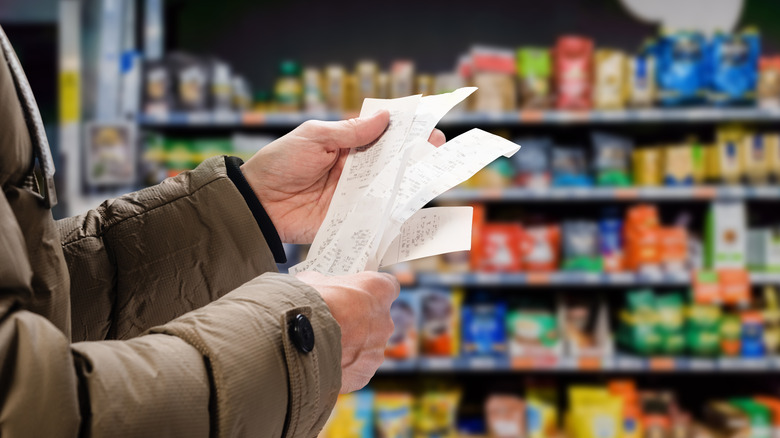France Is Solving Grocery Inflation With A Rare Deal
Although some people may find grocery shopping a chore, rising food costs have others feeling a significant financial burden. Previously, Deloitte reported that the Food and Agriculture Organization's (FAO's) Food Prices Index was the highest that it has been since 1990. While prices are said to have lowered since the highs of 2022, some consumers remain uncertain when shopping for groceries. Soaring prices can be attributed to many factors, including the ongoing conflict in Ukraine and rising freight costs. However, while global economies constantly fluctuate, downturns can be hard to bear. In France's case, it appears the country is turning away from a laissez-faire economic policy and requiring retailers to drop their prices.
France has the third-largest European economy. While both the country's private and public sectors contribute to the nation's GDP, there has been a concerted effort to reduce government spending, decrease barriers to employment, and support lower-income citizens. In a recent announcement by the French Finance Minister, the government has decided to take control of food costs as part of these efforts. It seems that instead of a hands-off approach, France is now directly impacting the price of that box of pasta.
French government mandates that grocery stores will offer the lowest possible prices
Occasionally, government intervention can benefit specific industries and pass savings onto consumers. For example, in a recent unprecedented action by French Finance Minister Bruno Le Maire, Reuters reports that the French government and the country's leading supermarket chains will reduce prices on food staples for three months. The "lowest possible price" mandate is meant to offset food inflation that has impacted consumers.
With food inflation predicted to be a significant factor in the first half of 2023, the agreement between the French government and supermarket chains is believed to be a lifeline for lower-income families. Although some corporations would have preferred to implement this type of cost reduction on their terms, the requirement does feature some customization. Without passing on the losses to other entities in the supply chain, the supermarkets can choose which items are to be discounted. After the initial three-month period, the policy will be reevaluated.
Since supermarket companies are projected to lose "hundred of millions of euros" through this policy, there could be a ripple effect at another time. Even though some brands have started to reduce food costs, the economic policy does not occur in a vacuum. Still, lower consumer food costs can be an attractive short-term solution. However, how this change impacts the French economy is yet to be determined.
Should the U.S. government step in to fight grocery inflation?
For some U.S. shoppers, a trip to the grocery store can end with an empty wallet and a meager haul in the shopping cart. Although some companies have rolled back prices or offered lower-priced alternatives, the reality is that grocery inflation is not disappearing any time soon. With consumers continually feeling the pinch, some might wonder if the U.S. government should intervene to decrease food costs.
Previously, CNN.com asked various economists if governments should set the price for some essential goods. The overall consensus was negative. Although governments can intervene during times of crisis, it is believed that this can further distort the market. While it might be a temporary inflationary reprieve, the long-term impact can be detrimental. From creating supply and demand issues to cultivating long-term supply chain distributions, a quick-fix solution to inflation is not always helpful. Even though consumers may not want to see the higher prices, it takes time for the economy to correct itself. Until everything stabilizes, consumers will have to deal with higher costs.


